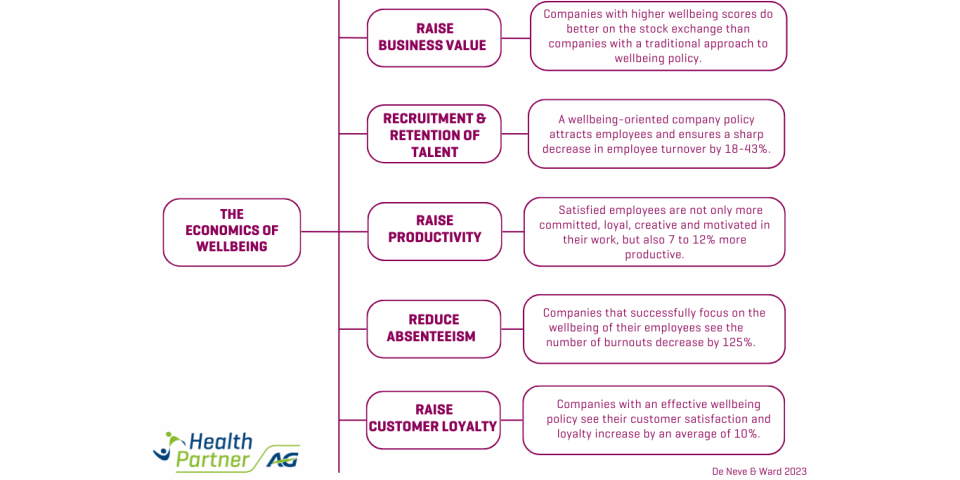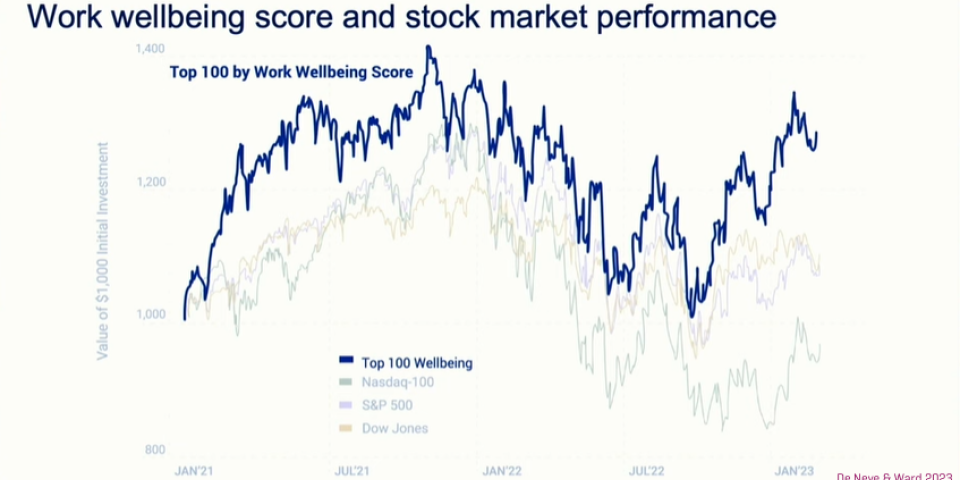How increased wellbeing brings more profit
Did you know that as employee wellbeing increases, so does a company’s stock market value? Or that a wellbeing-oriented corporate culture reduces the risk of a burnout by 125%? These are just a few examples of how The Economics of Wellbeing can also change your view on successful business forever.
Towards a new vision of success
Traditional measures of success such as profit margins or market share were often the only markers of a company’s succes in the past. Yet employee wellbeing is an equally important element in assessing success. This holistic view is often called The Economics of Wellbeing.
Groundbreaking research
The vision behind The Economics of Wellbeing is based on the scientific consensus that there is a positive correlation between wellbeing, prevention, and short- and long-term financial business performance. Especially in recent years, a lot of groundbreaking research has been conducted on this topic.
Prof Jan Emmanuel de Neve, has been conducting scientific research on the relationship between economic growth and workers' wellbeing for decades now. He's a leading expert in welfare economics at Oxford University and one of the advocates of The Economics of Wellbeing. In this TED talk he delves deeper into the subject. His conclusion? More wellbeing, and not just more prosperity, promotes people's happiness.
He refers to the Easterlin Paradox principle, the renowned theory demonstrating only a temporary correlation between prosperity and happiness. Figures from the European Commission since 1985 corroborate this notion. The average happiness level of Europeans has remained stable at 3 on a scale of 4, while Gross Domestic Product (GDP) has increased by 50%.
Five major benefits of satisfied employees:
Determining the concrete returns on investment in wellbeing is no easy task. Every organization, every team, every employee faces unique challenges, opportunities, and environmental factors. Nevertheless, there is ample evidence that the vision behind The Economics of Wellbeing actually works. We outline 5 significant advantages for you of a strong wellbeing policy.

1. Higher stock market value
Do you suspect your management is likely to consider wellbeing ‘fluffy’ or even irrelevant? If so, this insight might change their minds.
Scientific research by Oxford professor and wellbeing expert Jan-Emmanuel De Neve reveals a strong correlation between investments in employee wellbeing and the value of the company and its profitability.
Remarkably: even the stock curves of large companies are found to parallel the wellbeing level of their employees. Thus, companies with higher wellbeing scores perform better in the stock market than those with a traditional interpretation of wellbeing policies.
Wellbeing is not only a good measure of a company’s current performance, but also proves to be an effective predictor of future success.

2. Drop in employee turnover
Research published by Gallup shows that wellbeing-focused company policies produce more satisfied employees, but also a 18% to 43% drop in employee turnover. A study by Effectory shows similar results and sees a 22% drop in turnover. How many employees does your company have? Feel free to do the math.
Response to ‘The Great Resignation’?
The battle for talent in the job market is fiercer than ever. A survey by Deloitte and Randstad shows that 59% of employees are willing to switch to a company that pays more attention to their wellbeing. The desire for a better work-life balance is especially strong among the younger workers but resonates across all age groups.
Employees who are happy in the workplace? They are eight times more likely to stay with a company, according to research firm McKinsey & Company.
59% of employees are willing to move to a company that pays more attention to their wellbeing.
3. Up to 12% more productivity
Research conducted by De Neve and Oswald in 2012 confirms that employee happiness is significantly positively correlated with productivity in the workplace. Satisfied employees are found to be up to 12% more productive than others.
This is further supported by lower absenteeism rates and a positive corporate culture. A recent case study in Journal of Organizational Behavior also notes a significant drop in absences among satisfied employees.
Satisfied employees are not only more engaged, loyal, creative and motivated in their work, but also 7 to 12% more productive.
4. Lower risk of burnout
Companies that successfully commit to the wellbeing of their employees see a 125% reduction in burnout, shows the research done by Harvard Business Review. Companies thus not only avoid a major financial cost, but this also has a positive impact on healthcare and society.
Painful figures
Indeed, burnout figures in Flanders are disastrous: between 2018 and 2021, the number of people with burnout rose by as much as 66%, shown by figures from the Independent Sickness Insurance Funds.
The 2023 Workability Monitor shows that 36,1% of employees struggle with work-related stress complaints, which amounts to about 330.000 people at an increased risk of burnout.
The findings underline the seriousness of the situation and the need for a thoughtful wellbeing policy in every company.
5. Increased customer loyalty
The effect of satisfied employees makes itself felt beyond company walls too. Research by research firm Gallup states that companies that focus more on the wellbeing of their employees can achieve a +10% increase in customer satisfaction and loyalty. Just to say: your employees’ happiness radiates to your customers.
Companies with effective wellbeing policies see an average 10% increase in customer satisfaction and loyalty.
Wellbeing policy: from nice-to-have to must
In a labour market climate where ‘The Great Resignation’ is forcing almost every organization to rethink its corporate culture, the message is clear: implementing a wellbeing policy is essential.
Yet fostering wellbeing also goes far beyond simply allowing flexible working hours, offering occasional training or a fruit basket in the office. It requires a fundamental reappraisal of how we define work and success.
The value of wellbeing investments transcends the numbers on the balance sheet. They are an investment in the health and satisfaction of your team, but also in the short- and long-term resilience of your organization.
Organizations that are already investing in staff wellbeing? Those see a decrease in stress and burnouts, a drop in turnover and absenteeism, and an increase in productivity and customer satisfaction. This, in turn, leads to better financial results and a stronger market position.
Still need reasons to invest in a well-founded wellbeing policy?